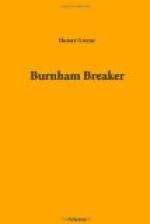“Yes, sir; it was pirty dusty an’ hot, an’ I had to walk a good ways, an’ my shoes hurt me so’t I had to take ’em off, an’ I didn’t have time to put ’em on again after I got here. Besides,” continued the boy, looking down apologetically at his bruised and dusty feet, “I hurt my feet a-knockin’ ’em against the stones when I was a-runnin’, an’ they’ve got swelled up so ’at I don’t believe I could git my shoes on now, any way.”
Many people in the room besides Mrs. Burnham had tears in their eyes at the conclusion of this simple statement.
Then Ralph grew white about the lips and looked around him uneasily. The judge saw that the lad was faint, and ordered a tipstaff to bring him a glass of water. Ralph drank the water and it refreshed him.
“You may cross-examine the witness,” said Goodlaw to the plaintiff’s attorney.
Sharpman hardly knew how to begin. But he felt that he must make an effort to break in some way the force of Ralph’s testimony. He knew that from a strictly legal point of view, the evidence was of little value, but he feared that the boy’s apparent honesty, coupled with his dramatic entrance, would create an impression on the minds of the jury which might carry them to a disastrous verdict. He leaned back in his chair with an assumed calmness, placed the tips of his fingers against each other, and cast his eyes toward the ceiling.
“Ralph,” he said, “you considered up to yesterday that Mr. Craft and I were acting in your interest in this case, did you not?”
“Yes, sir; I thought so.”
“And you have consulted with us and followed our advice until yesterday, have you not?”
“Yes, sir.”
“And last night you came to the conclusion that we were deceiving you?”
“Yes, sir; I did.”
“Have you any reason for this opinion aside from the conversation you allege that you heard?”
“I don’t know as I have.”
“At what hour did you reach my office last evening?”
“I don’t know, I guess it must ‘a’ been after eight o’clock.”
“Was it dark?”
“It was jest dark.”
“Was there a light in the office when you came in?”
“They was in the back room where you an’ Rhymin’ Joe were.”
“Did you think that I knew when you came into the office?”
“I don’t believe you did.”
“Why did you not make your presence known?”
“Well, I—I—”
“Come, out with it! If you had any reason for playing the spy, let’s hear what it was.”
“I didn’t play the spy. I didn’t think o’ bein’ mean that way, but when I heard Rhymin’ Joe tell you ’at I wasn’t Robert Burnham’s son, I was so s’prised, an’ scart-like ’at I couldn’t speak.”
This was a little more than Sharpman wanted, but he kept on:—
“How long were you under the control of this spirit of muteness?”
“Sir?”
“How long was it before the power to speak returned to you?”




